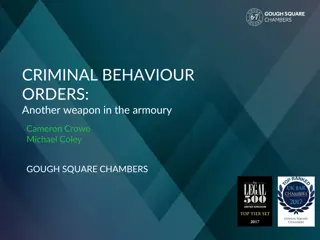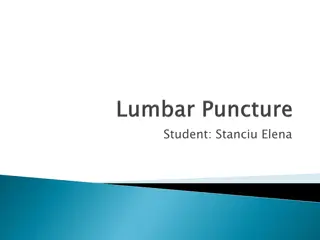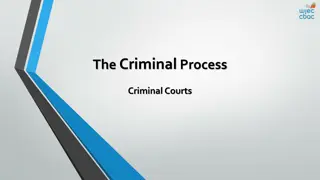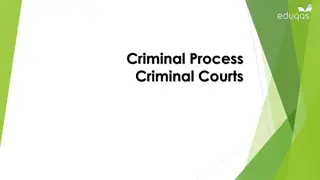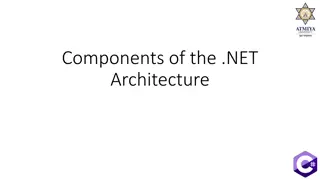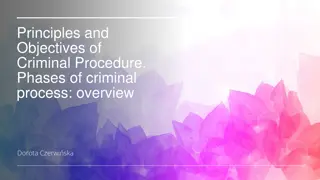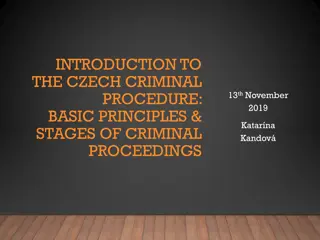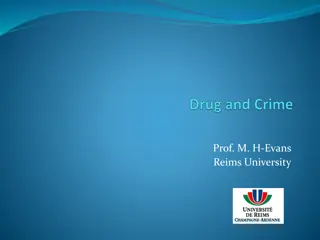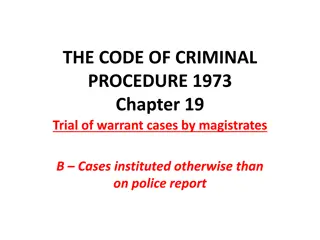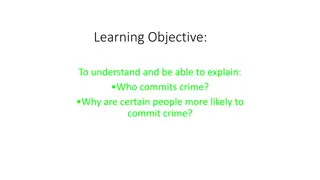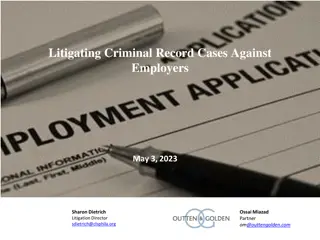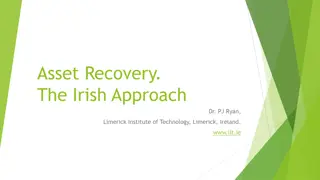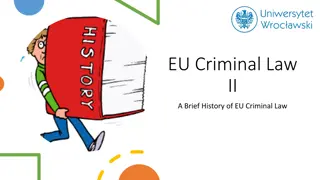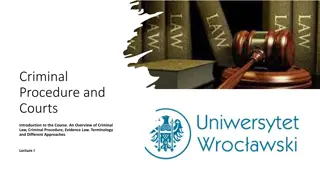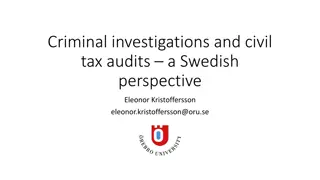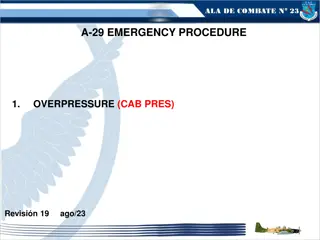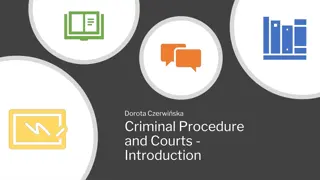Parliamentary Procedure
Learn about the role, principles, and importance of parliamentary procedure in running effective meetings. Explore the basics of Robert's Rules of Order, agenda building, the relationship between parliamentary procedure and the Brown Act, and tools for chairs to facilitate discussions and decision-m
1 views • 25 slides
Understanding Cyberbullying Laws in Canada's Criminal Code
Discover how cyberbullying crosses legal boundaries in Canada, including offenses such as sharing intimate images without consent, criminal harassment, uttering threats, and more outlined in the Criminal Code.\n
5 views • 15 slides
Overview of Common Procedure for Requesting COAMU Advice
This content provides information on the common procedure for requesting COAMU advice in the Brabant Wallon, Hainaut, Namur, Liège, and Luxembourg regions. It covers topics such as the legal basis, reasons for procedure reform, principles of the new procedure, and steps for implementation. Key poin
10 views • 16 slides
United Nations Survey on Crime Trends and Operations of Criminal Justice Systems
The United Nations Survey on Crime Trends and Operations of Criminal Justice Systems (UN-CTS) focuses on harmonizing data collection, identifying crime patterns, improving monitoring of the criminal justice system, and enhancing international comparability of crime statistics. It was mandated by the
3 views • 18 slides
Harmonisation of Substantive Criminal Law in the EU
The Treaty of Lisbon serves as a legal foundation for the harmonisation of substantive criminal law within the European Union. It establishes the basis for judicial cooperation, mutual recognition of judgments, and approximation of laws across Member States. The treaty allows for the establishment o
2 views • 60 slides
Understanding Criminal Behavior from a Social Psychological Perspective
This unit delves into the application of social psychology in the legal system, exploring the nature of criminal behavior, responses to criminal acts, the criminal justice system, and rehabilitation. It examines the social ecological perspective of criminal acts and outlines key points related to th
0 views • 50 slides
Understanding Psychological Theories of Criminal Behavior
Psychologically-based criminologists attribute criminal behavior to individual factors such as negative early childhood experiences and inadequate socialization, leading to criminal thinking patterns and incomplete cognitive development. Probation and parole practices are influenced by rehabilitatio
0 views • 30 slides
Understanding Criminal Law and Procedure: Greenvisor's Case
A case study involving embezzlement by Joe Greenvisor, the chief accountant of Nobreath Corporation, sheds light on criminal acts, duties, intent, and societal perspectives on crime. Despite Greenvisor's charitable intentions, his actions constituted a crime under the law. The elements of criminal a
0 views • 47 slides
Understanding Criminal Offences: A Comparative Analysis
Exploring the concept of criminal offences, this article delves into the definitions in common law and continental law systems. It discusses the structural elements, harmful nature, prohibition, punishment, and distinctive aspects of criminal acts. A comparison between common law and continental law
1 views • 33 slides
Development of Indian Penal Code (IPC) 1860 and Its Impact in British India
The Indian Penal Code (IPC) of 1860 was introduced in British India after a series of historical events led to the need for a comprehensive criminal justice system. The disintegration of the Mughal Empire paved the way for British takeover, resulting in variations in criminal laws across different B
1 views • 24 slides
Understanding the Process of Sealing Criminal Records
Having a criminal record sealed means making it inaccessible to the public while keeping it available to criminal justice agencies. Eligibility for sealing records requires taking action, and not everyone qualifies. This clinic provides guidance on the sealing process and the types of records that c
0 views • 36 slides
Understanding the Roles in Criminal Justice System
The criminal justice system involves three branches of government, each with specific responsibilities, operating at federal, state, and local levels. Law enforcement is primarily a local government function, while legislatures determine criminal laws and punishments. Statutes organized into codes d
0 views • 35 slides
Understanding Substantive Criminal Law in the American Legal System
Substantive criminal law encompasses the definition of criminal acts and penalties, with a core principle being that there can be no crime without a corresponding law. The American legal system follows the Rule of Law, ensuring that all individuals are subject to legal governance. Constitutional lim
0 views • 22 slides
Confiscation in the Criminal Courts: A Guide to Proceeds of Crime Law
Confiscation in the criminal courts involves depriving defendants of benefits gained from criminal conduct within their means. The Proceeds of Crime Law in the Cayman Islands sets guidelines for these proceedings, emphasizing that confiscation is not a form of punishment but aims to recover obtained
3 views • 17 slides
Understanding the Process of Sealing Criminal Records
Sealing criminal records means restricting public access to the records, although they are not destroyed and remain accessible to certain entities. Eligibility requirements vary, and action must be taken to seal records. This presentation covers the process, eligibility criteria, and what to expect
1 views • 36 slides
Worksafe Procedure NR/L2/OHS/00112 Safety Hour Overview
The Worksafe Procedure NR/L2/OHS/00112 was introduced in 2009 to empower Network Rail employees to raise safety concerns and stop work if necessary. This procedure ensures a safe work environment by allowing employees to assess risks, establish safe work practices, and receive support from managemen
0 views • 8 slides
Understanding Civil and Criminal Complaints in Legal Cases
Explore the distinctions between civil and criminal complaints in legal scenarios. Learn how a civil case seeks monetary damages while a criminal case pursues punishment for wrongful actions. Understand the roles of plaintiffs and prosecutors, burden of proof, and outcomes in both civil and criminal
0 views • 34 slides
Briefing on the Criminal Procedure Amendment Bill [B12-2021] to the Portfolio Committee on Justice and Correctional Services
The Criminal Procedure Amendment Bill aims to address the constitutional invalidity of section 154(3) of the Criminal Procedure Act by enhancing protection for child victims, accused, and witnesses in criminal proceedings. The Bill proposes prohibiting the publication of information revealing their
0 views • 12 slides
Understanding Criminal Behaviour Orders: An Overview and Legal Requirements
Criminal Behaviour Orders (CBOs) are issued following conviction for criminal offences to tackle serious and persistent anti-social behavior. This talk provides an overview of CBOs, legal requirements, when they are appropriate, and practical tips for implementation. The orders can prohibit or requi
0 views • 12 slides
Lumbar Puncture: Procedure, Complications, and Clinical Applications
Lumbar puncture, also known as LP, is an invasive procedure used to obtain cerebrospinal fluid (CSF) for diagnostic and therapeutic purposes. This procedure has a long history dating back to ancient times, with modern techniques developed in the late 19th century by Heinrich Quincke. LP is crucial f
2 views • 11 slides
Lumbar Puncture: Indications, Contraindications, and Post-procedure Considerations
Lumbar puncture is a medical procedure involving the insertion of a needle into the spinal subarachnoid space to collect cerebrospinal fluid for diagnostic or therapeutic purposes. Indications for performing a lumbar puncture include suspicion of meningitis, subarachnoid hemorrhage, CNS diseases lik
0 views • 17 slides
Asset Recovery Practices in England and Wales: Criminal vs. Civil Proceedings
Asset recovery in England and Wales involves a combination of criminal and civil proceedings to secure justice and return funds to victims of crime. The CPS's Proceeds of Crime Division plays a crucial role in obtaining Restraint Orders and Confiscation Orders. Civil recovery, focusing on illicit fi
0 views • 11 slides
Understanding the Criminal Justice System in Court Proceedings
This content explores various aspects of the criminal justice system, including the adversarial system, classification of offenses, criminal court systems, trial procedures, plea bargaining, and more. It covers models of criminal justice systems, classification of offenses, modes of trial, sending f
0 views • 15 slides
Overview of the Criminal Justice System
Exploring the complexities of the criminal justice system, this content delves into the adversarial system, classification of offenses, criminal court system, modes of trial, plea bargaining, trial procedures, and various criminal process models.
0 views • 15 slides
Understanding the .NET Architecture Components
The .NET architecture comprises various key components such as the Common Language Specification, Code Manager, Managed Code, Unmanaged Code, and Native Code. These components play crucial roles in the development and execution of applications within the .NET framework. Managed code is executed by t
0 views • 21 slides
Objectives of Criminal Proceedings in Various Legal Systems
The objectives of criminal proceedings aim to ensure justice by acquitting the innocent and convicting the guilty, while also upholding the rule of law, protecting legally recognized interests, and resolving cases efficiently. This overview covers the principles and objectives of criminal procedure
0 views • 25 slides
Overview of Czech Criminal Procedure: Principles and Process
Czech criminal procedure combines inquisitorial and accusatorial models, with the pre-trial phase led by the public prosecutor and the trial phase overseen by a judge. Inspired by the Anglo-American adversarial system, Czech proceedings feature deviations tailored to the continental model. Key princ
0 views • 44 slides
The Statistical Association Between Substance Misuse and Criminal Behavior
This brief synthesis discusses the statistical association between substance misuse (specifically drugs and alcohol) and criminal behavior. It draws upon meta-analyses investigating the links between drug use and crime, as well as alcohol consumption and violent behavior. Various theories are explor
0 views • 12 slides
Evolution of Criminal Law and Thought: From Pre-Classical Era to Enlightenment
Explore the progression of criminal law and thought from the Pre-Classical School of Thought to the Enlightenment era. Delve into concepts like folkways, mores, and the origins of criminal law, including examples such as societal norms, dress codes, and supernatural explanations for behaviors during
0 views • 23 slides
Trial of Warrant Cases by Magistrates under the Code of Criminal Procedure 1973
The Code of Criminal Procedure 1973 Chapter 19 outlines the procedure for trial of warrant cases by magistrates where the prosecution presents evidence to support the case against the accused. Section 244 requires the magistrate to hear the prosecution and take all evidence presented. If the evidenc
0 views • 12 slides
Exploring the Factors Behind Criminal Behavior
Understanding who commits crime and why certain individuals are more likely to engage in criminal activities involves exploring a range of social and biological factors. While biology suggests a genetic predisposition to criminal behavior, sociology emphasizes the influence of social factors like fa
0 views • 9 slides
Understanding Title VII and Criminal Records in Employment Discrimination Cases
This presentation delves into the intersection of Title VII and criminal records in employment discrimination cases. It covers the lack of specific protections for individuals with criminal records under Title VII, the implications of disparate impact cases, and the development of standards in the c
0 views • 15 slides
Asset Recovery: The Irish Approach towards Criminality
The paper discusses the emergence and structure of the Criminal Assets Bureau (CAB) in Ireland, highlighting the shift in approach towards dealing with criminal activities and the focus on targeting the proceeds of crime. It explores the operational positions and approaches adopted by CAB, emphasizi
0 views • 7 slides
Evolution of EU Criminal Law Through Cooperation and Commitment
The history of EU criminal law traces back to the Treaty of Rome in 1957 when the EU initially focused on economic matters. Over the years, with the judgment in the Stauder case in 1969 and the formation of the TREVI group in the 1970s, cooperation on security and combating terrorism laid the founda
0 views • 59 slides
Dallas Criminal Attorney | Frisco Criminal Attorney- Reggie London
Dallas Criminal Attorney: Dedicated Team of Criminal Defense Lawyers Led by Reggie London, Known for Unwavering Reliability and Steadfast Support. \/\/reggielondonlawyer.com\/
2 views • 7 slides
Introduction to Criminal Procedure and Courts: Overview and Terminology
This piece provides an introduction to a course on Criminal Procedure and Courts, covering topics such as criminal law, evidence, courts, and international legal bodies. It outlines the exam format, information on lecturers, and essential knowledge needed for the course. Additionally, it shares insi
0 views • 28 slides
Exploring Criminal Law Basics
Delve into the fundamentals of criminal law through topics such as the definition of crime, the elements of a crime, why we have criminal law, and real-life scenarios to understand legal concepts. Discover the significance of criminal law in maintaining safety, encouraging good behavior, and promoti
0 views • 27 slides
Understanding the Interaction Between Criminal Investigations and Civil Tax Audits in Sweden
The relationship between criminal investigations and civil tax audits in Sweden is explored, highlighting how tax audits and criminal proceedings run concurrently. The mens rea requirement for criminal sanctions and tax surcharge, as well as the integration between criminal sanctions and tax surchar
0 views • 13 slides
A-29 Emergency Procedure: Overpressure (CAB PRES)
An overview of the emergency procedure for overpressure (CAB PRES) in the A-29 aircraft. The procedure outlines actions to take when cockpit differential pressure exceeds 5.75 psi, including switching off the air conditioning, maintaining a maximum altitude of 25,000 ft, and following the SUPPLY FAI
0 views • 4 slides
Fundamentals of Criminal Law and Procedure
Explore the key aspects of criminal law and procedure, including definitions of crime, the role of criminal procedure, sources of law, phases of the criminal process, participants involved, and rules of evidence in legal proceedings. Gain insight into how criminal law is distinct from civil law and
0 views • 24 slides







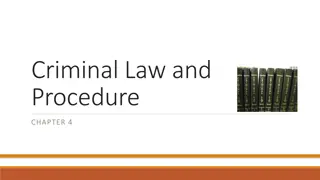
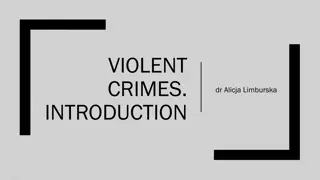


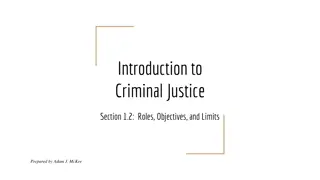
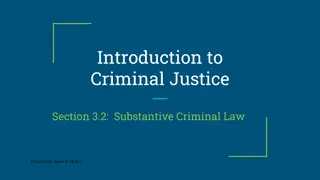
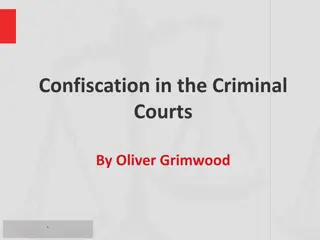

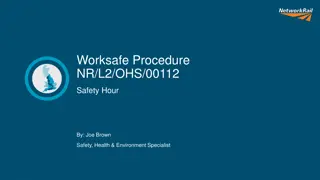
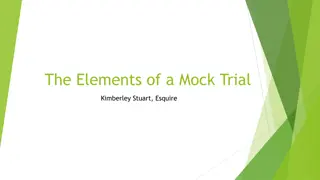
![Briefing on the Criminal Procedure Amendment Bill [B12-2021] to the Portfolio Committee on Justice and Correctional Services](/thumb/157093/briefing-on-the-criminal-procedure-amendment-bill-b12-2021-to-the-portfolio-committee-on-justice-and-correctional-services.jpg)
